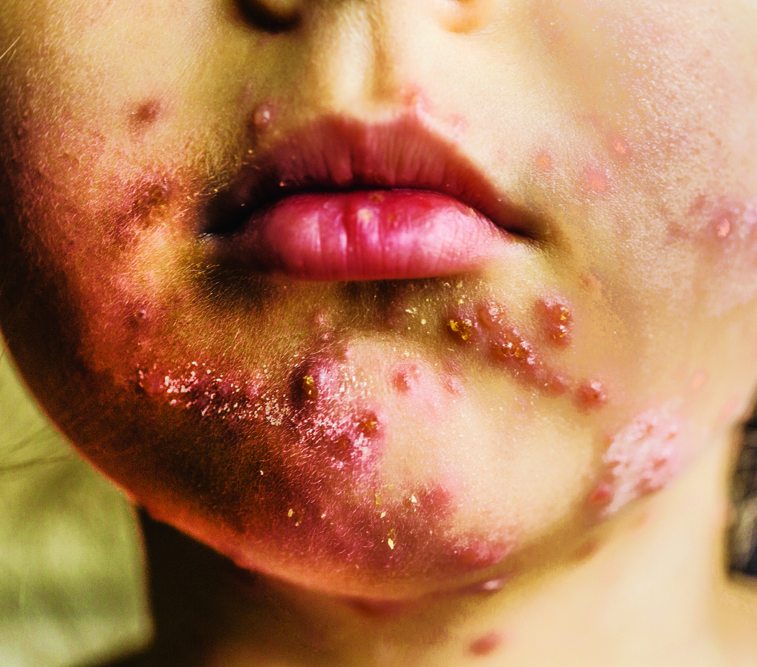
Vaccination prevents 2-3 million deaths a year, according to the World Health Organization (WHO), which identifies hesitation to vaccinate in its top 10 threats to global health in 2019. Measles has seen a 30% resurgence globally, including in places like the U.S. where it was long thought eradicated. Colorado ranks last in the nation for the Measles, Mumps, Rubella vaccine among kindergarteners.
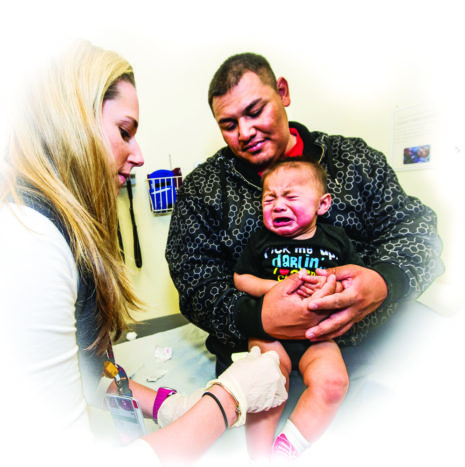 Editor’s Note: This article is based on information about vaccines that has been scientifically researched and verified.
Editor’s Note: This article is based on information about vaccines that has been scientifically researched and verified.
In 2000, the U.S. declared that it had eliminated measles within its borders. On January 15, 2019, an adult who had traveled overseas went to a few retail outlets and an urgent care in Stapleton before being diagnosed with measles and hospitalized. “We got lucky,” says Dr. Sean O’Leary, a Stapleton parent and pediatric infectious disease and vaccine specialist with the University of Colorado School of Medicine and Children’s Hospital, and also a spokesperson for the American Academy of Pediatrics. “The Public Health Department tracked down everywhere this person went and who they came into contact with, and there were no secondary cases in this instance.”
Elsewhere in the U.S., hundreds of measles cases have found their way into ERs this year, part of a growing number of vaccine-preventable diseases on the rise. A thoroughly debunked study combined with alarmist social media have created fears of vaccines in some parents’ minds. A longitudinal study of over 600,000 children, however, just last month affirmed—again—that there is no link between autism and the MMR (Measles, Mumps, Rubella) vaccine.
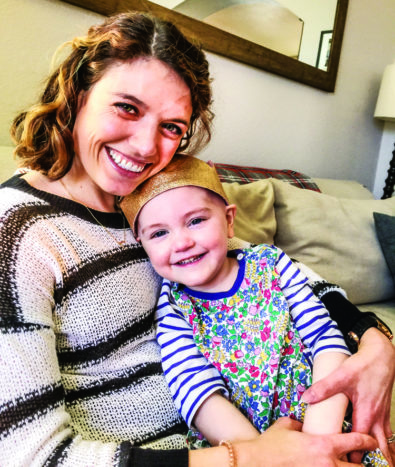
Caroline Dane and her daughter Nora, who is undergoing chemotherapy for brain cancer, rely on community vaccination to safeguard Nora’s health.
Immune-compromised people are at risk
“I feel like those who don’t vaccinate are putting their—disproven, debunked—fear of autism above my child’s life,” says Stapleton parent and teacher Caroline Dane. Dane’s daughter Nora, who turns 3 on April 2, is fighting brain cancer. Every three weeks, another round of chemotherapy wipes out her white blood cell counts. Though Dane had vaccinated Nora prior to her June 2018 diagnosis, chemotherapy has eliminated whatever immunity she had. “I used to dismiss the anti-vaccination folks and think it was a personal decision. Now, I see it is really a communal responsibility that protects our youngest and weakest who cannot be vaccinated.”
Dr. O’Leary echoes Dane’s emphasis on the importance of what is sometimes referred to as “herd immunity” or “community protection.” Even a vaccine like that for influenza, which each year only protects against a few strains of the virus, saves lives. “Immunizing a school-age population protects the elderly at least as well as vaccinating the elderly,” says Dr. O’Leary. To safeguard transplant recipients, chemo patients and others with compromised immune systems, a population’s vaccination rates need to be upward of 95% for highly contagious diseases like pertussis and measles.
Colorado ranks last nationally for MMR vaccine in Kindergartners
Colorado is nowhere near that 95% figure. In fact, it ranks last nationally in the most recent Centers for Disease Control ranking of states for MMR among kindergartners. “It’s not a matter of if we have an outbreak in Colorado but when. We have enough pockets in Colorado that if there were a case of measles introduced in the right space, we would see an outbreak,” says Dr. O’Leary.
“Parents should follow the vaccine schedule recommended by their pediatrician to protect their children when they are most vulnerable to these diseases, which is in infancy. It’s also about keeping schools safe for everyone. If you’re sending your child to school, they should be vaccinated,” says Dr. O’Leary.
While all states require that children be vaccinated to attend licensed child care and school, Colorado is one of 17 permitting both a religious exemption and one for those with “a personal belief that is opposed to immunizations” (Colo. Rev. Stat. § 25-4-903). Fully 88% of Colorado exemptions fall into this vague category of “belief.” Simply not believing the overwhelming weight of scientific evidence is sufficient to opt-out. State Rep. Kyle Mullica (D-Northglenn), a nurse and parent of three, recently stated that he is drafting legislation to reduce the availability of nonmedical exemptions in Colorado. Though the Front Porch has not seen a draft of this legislation, a change would put Colorado more in line with recommendations of all the major professional organizations, which support allowing only medical exemptions according to Dr. O’Leary.
Fearing the science more than the disease
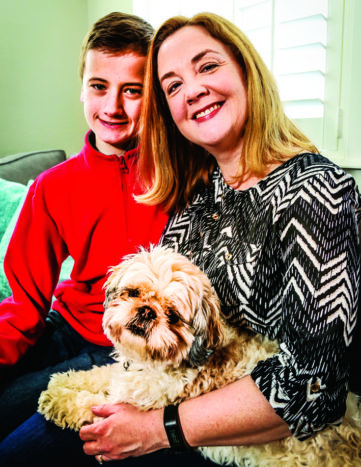
Dr. Kristy Crooks, who has a Ph.D. in neurobiology, says she did not hesitate to get both of her children vaccinated despite her son’s diagnosis of autism at age 4. She says, as a scientist she knows there’s no link between vaccines and autism.
“A lot of people recently just don’t trust experts, and it’s hard for me to understand that. As a scientist, I see myself as an expert in science. When something goes wrong with my car I don’t look to the internet; I take my car to my mechanic. I don’t understand the mindset of not trusting experts,” says Stapleton mom and immunologist at the University of Colorado Anschutz Medical Campus Aimee Bernard, Ph.D. She ascribes some of the anxiety and suspicion people feel towards vaccination to the fact that they haven’t witnessed the way measles or polio and other vaccine-preventable infectious diseases ravage an individual. “People haven’t seen the disease, so they fear the science more than the disease.”
Stapleton mom Dr. Kristy Crooks has a Ph.D. in neurobiology and works as a clinical molecular geneticist. She is also the mother of 13-year old Joey, who was diagnosed at age 4 with autism. At two weeks of age, Dr. Crooks says she intuitively knew something was different about her son. When he was finally diagnosed, “It felt like a relief. It was wonderful to have a name for it and be able to take advantage of early intervention.” She takes issue with parents who choose not to vaccinate. “I think it shows their privilege, that they can make that decision. They feel empowered enough to say ‘no’ and think they can rest easy because we are all vaccinating ours. But in many communities and schools, the vaccination rate is lower than what’s needed to prevent an outbreak if the disease is introduced, and this leaves our most vulnerable children and adults at risk.”
Thousands of rigorous studies published in peer-reviewed, reputable scientific journals document vaccines’ safety and efficacy. Dr. Crooks has read many of these, and did not hesitate to vaccinate either of her children, confident that no link exists between vaccines and autism. For Dr. Crooks, “Doing research is not looking at a website. That is not equivalent to the research a scientist does….A well-informed belief is open to change based on new evidence.”
Parents want to do what’s best for their child
Drs. Bernard, Crooks and O’Leary appreciate that parents who oppose or hesitate to vaccinate are all coming from a place of love and wanting to do what’s best for their children. Dr. O’Leary’s research considers how to address the barriers to vaccination. For pediatricians who have built up rapport and trust with the families they serve, taking a little more time at a well child visit to allay concerns can be invaluable.
“Vaccines work. They are among the most cost-effective health measures we take,” says Dr. O’Leary. According to the Centers for Disease Control, in 1963, at the inception of the measles vaccination program, “about 3 to 4 million people got measles each year in the United States. Of those people, 400 to 500 died, 48,000 were hospitalized, and 4,000 developed encephalitis (brain swelling) from measles.” In fact, those anecdotes that get shared about someone’s sister’s neighbor’s aunt who contracted an illness despite being vaccinated prove their efficacy, since most people are vaccinated. “For public health advocates, who promote prevention, when we do our jobs really well, nothing happens. Kids don’t get sick, but that doesn’t grab headlines the way a celebrity making a false claim about vaccines gets attention,” notes Dr. O’Leary.
“It’s my daughter, your mother, your neighbor’s newborn” you’re protecting
Even after the year of chemo treatments ends and Nora regains her health, it will be years before her immune system will be able to take live vaccines to prevent contagious and life-threatening diseases. Dane will return to teaching part-time at a neighborhood elementary school next year, and she worries that if an unvaccinated child carries a disease like measles or chicken pox into the school, her daughter might face a life-threatening vaccine-preventable disease.
“It’s not just a number or an infographic. These are real human beings who are susceptible to these diseases. It’s my daughter, your mother, your neighbor’s newborn,” implores Dane.
To see your school’s or district’s vaccination rates, go to: https://www.childrensimmunization.org/resource-library/
For reliable information on vaccines, Dr. O’Leary encourages parents to speak with their pediatricians about any concerns, and to consult reputable websites like those of the American Academy of Pediatrics and the Centers for Disease Control for more information.
Immunization in Colorado Schools (Statewide), 2017-2018
The Vaccine-Preventable Diseases Report



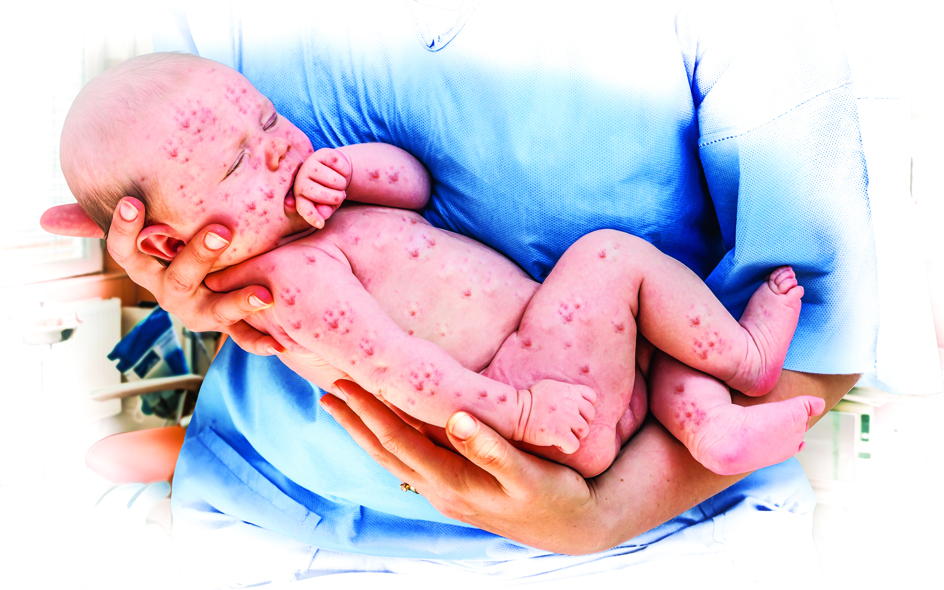
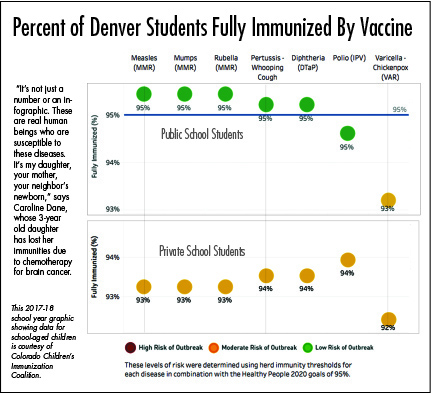
0 Comments